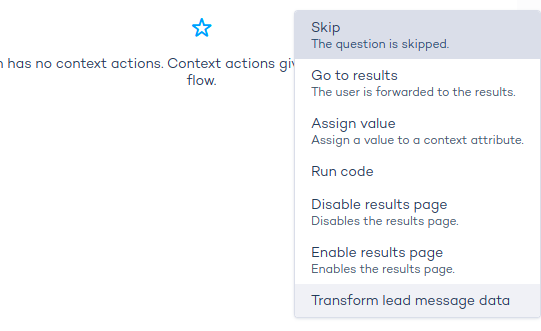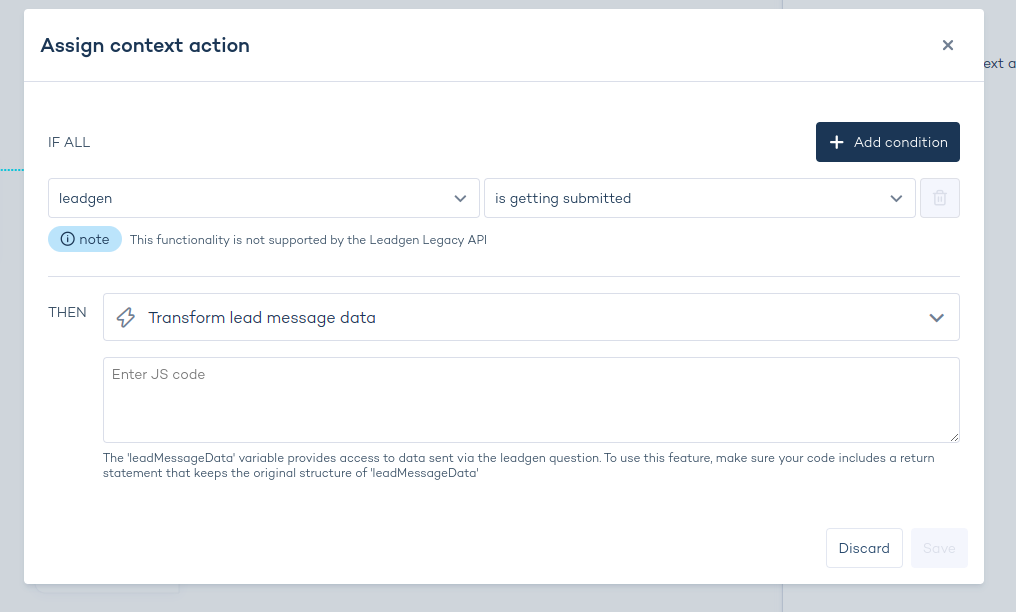Lead generation API
This guide will help you set up and use Zoovu’s Lead Generation (Leadgen) API to collect and manage lead data from Zoovu-powered forms. Here’s what you’ll learn:
- How to configure leadgen forms with webhooks
- The structure of the data you’ll receive
- How to use the new Leadgen API v2 for better data handling and security
- How to transform lead data before processing
Webhooks
Configuration
To set up a leadgen form using webhooks, select webhook in the dropdown and add the Webhook URL.
Payload structure
When a lead generation form is submitted, the Zoovu platform sends a POST request to the Webhook URL configured in the form. The request body includes:
- The name of the assistant.
- The submitted form data, where each form field has: an identifier (
questionId), the question text (questionText), the answer(s) (answers), presented as a list. - The question flow, which is a list of questions using the same object structure as above.
- The recommended products, with an indication of whether each product fully meets the customer's needs (
perfect) or only partly (alternative).
{
"advisorName": "documentation-assistant",
"submittedFormData": [
{
"questionId": 3167166,
"questionText": "name",
"answers": ["Tech Writer"]
},
{
"questionId": 3167167,
"questionText": "email",
"answers": ["[email protected]"]
}
],
"questionsFlow": [
{
"questionId": 3167168,
"questionText": "What's your preferred brand?",
"answers": ["Samsung"]
}
],
"recommendations": [
{
"sku": "880609E12",
"name": "Samsung Galaxy Book S 13.3-inch Qualcomm 8cx/8GB/256GB SSD Laptop with 4G - Mercury Grey",
"price": 1699,
"match": "perfect"
},
{
"sku": "88060912",
"name": "Samsung Galaxy Book S 13.3-inch Qualcomm 8cx/8GB/256GB SSD Laptop with 4G - Earthy Gold",
"price": 1699,
"match": "perfect"
},
{
"sku": "4,71802E+12",
"name": "Asus 14-inch Celeron Dual Core/4GB/64GB eMMC Laptop - Pearl White",
"price": 399,
"match": "alternative"
},
{
"sku": "9,42103E+12",
"name": "Ollee 14.1-inch Celeron-N3350/4GB/64GB eMMC Laptop",
"price": 399,
"match": "alternative"
}
]
}
Leadgen without server sessions
With Leadgen API v2, there is no longer a need to store questionnaire data in server sessions.
To start using the new API, simply disable the toggle in the assistant settings as shown below:
Leadgen legacy API relied on direct retrieval of questionnaire data from the session, while leadgen API v2 retrieve data directly from the browser, eliminating the necessity for enabling session storage by default.
This approach enhances security by avoiding the storage of potential PII data in sessions. It also provides a noticeable performance boost.
Additionally, the new API supports lead generation data transformation. To learn more, see the section below.
Transformation hook
The transformation of lead generation data is accessible through the new Leadgen API v2.
To use this functionality, establish a new context action named Transform lead message data within the lead generation question:

Transform lead message data action is triggered on the submission of a lead message.

This action allows for JavaScript execution, granting access to both the leadMessageData and contextSdk objects. The code requires return statement with origin structure of leadMessageData that contains:
submittedFormDataquestionsFlowrecommendations
These elements share identical models as those in the payload. However, it's important to note that submittedFormData and questionsFlow contain an extra property, namely questionType. While this property is not transmitted in the payload, its inclusion can be valuable for the logic of transformation.
{
"submittedFormData": [
{
"questionId": 2,
"questionText": "email",
"answers": ["[email protected]"],
"questionType": "EMAIL",
}
],
"questionsFlow": [
{
"questionId": 1,
"questionText": "What is your favorite game?",
"answers": ["Tomb raider"],
"questionType": "TEXT",
}
],
"recommendations": [
{
"sku": "12345",
"name": "Tomb Raider Game of the Year Edition",
"price": 1699,
"match": "perfect"
},
]
}
The structure of leadMessageData remains consistent across all recipient system types. However, it's important to note that any extensions (new custom properties) added to leadMessageData will only take effect for the webhook type.
examples:
// skipping questionsFlow and recommendations
return {
submittedFormData: leadMessageData.submittedFormData,
questionsFlow: [],
recommendations: []
}
// adding custom property works only for webhook type
return {
...leadMessageData,
additionalProperty: "Something to add"
}